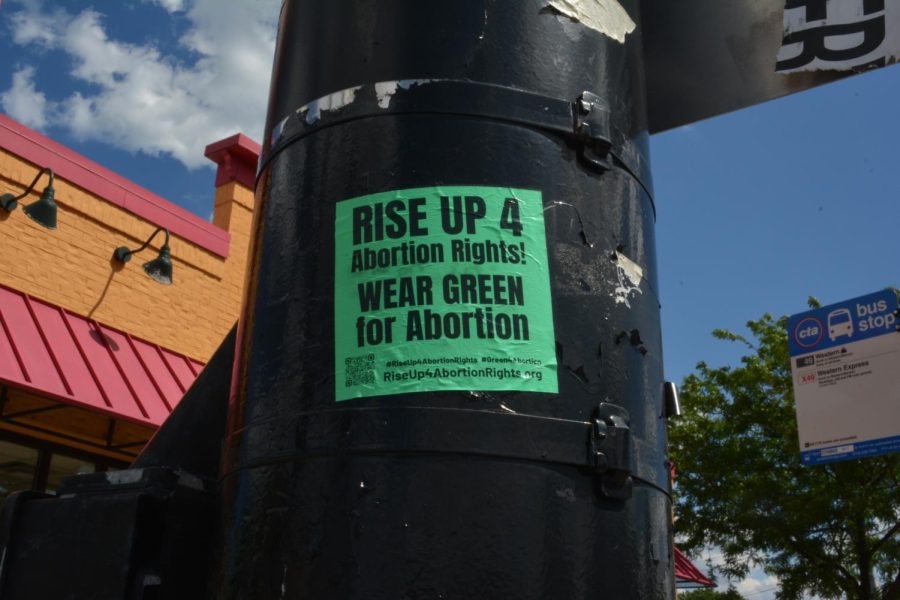Roe v. Wade: Why is bodily-autonomy up for debate?
An abortion rights sticker placed on a pole outside of the Popeyes across from Lane.
On May 3, 2022, for the first time in modern US Supreme Court history, a draft disclosing details of a decision was made public, while the decision was still pending. Its contents were a 98-page repudiation of Roe v. Wade (which granted the rights to abortion in 1973), as well as Planned Parenthood v. Casey (1992). This leaked draft was crushing; however, both myself and those who can become pregnant were relatively unsurprised, as devastating as this news was to hear.
Backlash against Roe v. Wade represents the sensitive, politicized argument surrounding abortion: we were taught growing up that it was OK to speak our minds and stand up for our rights and beliefs, but abortion rights were just too controversial. The idea that my right to bodily autonomy would be a subject for such heated discourse never made sense to me, and it never will. Further, the fact that a court decision made in 1973 for the greater advancement of women’s rights could potentially be repealed almost 50 years later is not only sickening, but nonsensical. Are we truly regressing to a point where our most basic human rights as women are being denied?
Many works of feminist prose have advocated for abortion rights. “The Feminine Mystique” and “The Second Stage” are both books written by renowned feminist activist and author Betty Friedan. I decided to read both as it became increasingly publicized that states on an individual basis were attempting to ban abortion rights for pregnant people. These were published respectively in 1963 and 1981; however, when the topic of abortion was presented, the language surrounding it was eerily similar to our very current situation. It was incredibly disheartening to witness, as Americans and as women, that despite having fought for these rights and having them be granted, it is still up for debate if we deserve the jurisdiction over our own bodies.
Lane students have taken matters into their own hands, specifically within their AP US Government and Politics classes. An assignment to write a letter to a congressman concerning a cause they believed in allowed junior Maddie Fleischman, Div. 375, to advocate for her and her peers’ rights to abortion.
“When I first heard about the Supreme Court draft to repeal Roe v. Wade, I thought about Ruth Bader Ginsburg, and how her last wish was to not be replaced until a new president was appointed,” Fleischman said. “Just thinking [that] all the work and fighting Ruth Bader Ginsburg did could be destroyed crushed me.”
Additionally, Fleischman wrote a letter to congressman Mike Quigley, inquiring about his thoughts concerning abortion, and to recognize the large impact that anti-abortion sentiments had on the high school population and beyond.
“I wrote my letter to congressman Quigley for my AP Government service learning project about the Women’s Health and Protection Act, because I believe it should be passed through the senate, if … Roe v. Wade is overturned, this bill will hopefully become a law, securing the safety of the right to an abortion,” Fleischman said
When she sent her letter, the bill had already passed through the House of Representatives. However, the letter was more so to hear Quigley’s position on it and to gain a better understanding of the issue. After just 4 hours, he replied stating his continuous pro-choice stance, and his pride in our city for its tenacious support for abortion.
Sophomore Brendan Bradish, Div. 475, was distraught as well regarding the Supreme Court draft leak. “My initial reaction was being surprised that this was even on the table. … Having been almost 50 years since it was decided, how the Supreme Court could stray so far away from what the people wanted, and ultimately how they think they have a say over what a woman does with her body,” Bradish said.
It’s also important to acknowledge that even if these issues do not have a direct impact upon someone’s life, this does not necessarily mean that they shouldn’t advocate for these rights. It is crucial for movements like this to be sustained through those with privilege utilizing it to create change.
“I think men can listen and be an ally to women and fight for women to be able to make choices for themselves,” Bradish said.
This is not to say that we have not made significant progress in the right direction. lllinois has recognized that many minors who do wish to recieve an abortion would feel unsafe telling their parents. As of June 1, they are now able to obtain an abortion without requiring parental knowledge. This law also stated that judicial discretion was no longer necessary to access abortion. Despite these positive strides in our own state, it feels difficult to celebrate these accomplishments knowing that so many other states do not possess the same privilege.
I sincerely hope that people continue to advocate for change, especially in states that will be restricting abortion rights — specifically young people. We need to be the change. We must make a conscious effort to prevent any further steps back in human rights. Therefore, vote. Write letters to congressmen. Protest and sign petitions. Do not let unjust laws feel like a permanent loss in the fight; there can always be change and progress.
Your donations directly fund the Lane Tech student journalism program—covering essential costs like website hosting and technology not supported by our school or district. Your generosity empowers our student reporters to investigate, write, and publish impactful stories that matter to our school community.
This website is more than a publishing platform—it's an archive, a research tool, and a source of truth. Every dollar helps us preserve and grow this resource so future students can learn from and build on the work being done today.
Thank you for supporting the next generation of journalists at Lane Tech College Prep!

Avaani is a senior, and this is her second year working with The Champion. While she enjoys covering news stories, her favorite stories to write are opinion...

Saskia is a senior, this is her third year with the Champion. She loves writing and editing, and is planning to pursue a career in English. She spends...





